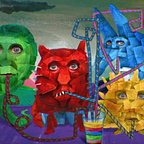Jung announces his down-going with an invocation.
The door of the Mysterium has closed behind me. I feel that my will is paralysed and the Spirit of the Depths possesses me.
And so he descends; his inner world blooms, and there is an opening-up and filling-out.
Jung is pragmatic about whether such a journey is ‘real’.
This I learned in the mysterium; To take seriously every unknown wanderer. They are real because they are effectual.
Jung passes the boundary and finds himself standing on the highest tower of a castle
I am far back in time: The air tells me so. My gaze wanders widely over solitary countryside, a combination of fields and forests. I am wearing a green garment. A horn hangs from my shoulder. I am the tower guard.
The watcher on the tower peers into the distance and sees a red point illuminated in the darkness. It is coming ever nearer along a winding road, disappearing for a while in forests then reappearing again: It is a horseman in a red coat.
He is coming to my castle: He is already riding through the gates. I hear steps on the stairway, the steps creak, he knocks….
A strange fear come over me: there stands the Red One, his long shape wholly shrouded in red, even his hair is red: I think in the end he will turn out to be the devil.
Jung, the serious, solitary watchman, stands face to face with this unknown red creature, who addresses him thus:
I greet you, man on the high tower. I saw you from afar, looking and waiting. Your waiting has called me.
Jung enquires about his identity:
Who am I? You think i am the devil. Do not pass judgement. Perhaps you can also talk to me without knowing who i am. What sort of superstitious fellow are you, that immediately you think of the devil?
The watchman and the Red One converse and Jung comes to the realisation that he would be ‘fleeing’ if he did not come to an understanding with this creature.
He intuits that the ‘devil as adversary’ is ones own, other standpoint. He (the devil) tempts you and sets a stone in your path, just where you least want it.
The watchman is serious and ponderous during the exchange and the Red One marvels, ‘Are you always so urgent?’
The Red One is cool and sneering: Jung appraises him, ‘You bring a certain gallows air with you.’
Their conversation is constantly at odds because the devil fails to take seriously anything that is the concern of others.
But then the discussion moves on to ‘dancing’.
What i said about dancing struck him because it is from his own domain. In such a manner i arrived at his seriousness and with this we reach common ground.
The devil states that life does not require seriousness and that it is better to dance through life. Jung concedes that he knows how to dance, but says that dancing goes with the mating season and there are those that are always in heat and others that dance ridiculously for their gods.
The devil tells Jung,’ Here my dear fellow. I doff my mask. Now i grow somewhat more serious, since this concerns my own province. It’s conceivable that there is some third thing for which dancing would be the symbol?’
The devil is convinced that dancing is neither lust, nor madness, but rather an expression of joy and in this Jung agrees.
The red of the rider transforms itself into a tender reddish flesh colour. And behold — Oh miracle — my green garments everywhere burst into leaf.
The devil, humanised before his eyes beseeches:
Don’t you recognise me brother, I am joy!
Jung, now transformed in green splendour like a tree in spring, responds:
Could you be joy? I see you as through a cloud. Your image fades. Let me take your hand, beloved, who are you, who are you?
That Joy might be the devil or the devil might be joy, must assuredly be worrisome to the right minded; And yet there is always something devilish about joy.
When I saw that the devil was joy, surely i would have wanted to make a pact with him, but you cannot make a pact with joy because it immediately disappears.
Therefor you cannot capture the devil; It is part of it’s essence that it cannot be caught. He is stupid if he lets himself be trapped; you gain nothing from one more stupid devil.
The devil always seeks to saw off the branch on which you sit. That is useful and protects you from falling asleep and from the vices that go along with it.
The devil is an evil element, but joy?
If you run after it, you see that joy also has evil in it, since then you arrive at pleasure and from pleasure go straight to hell; your own particular hell.
Through my coming to terms with the devil, he accepted some of my seriousness and I accepted some of his joy.
It is always a risky thing to accept joy , but it leads us to life and its disappointment, from which the wholeness of our life becomes.
